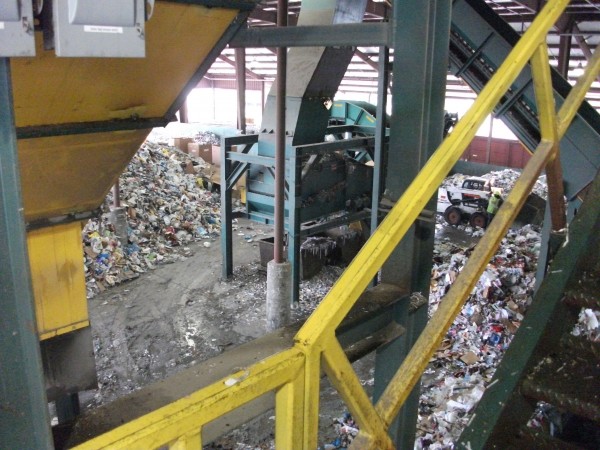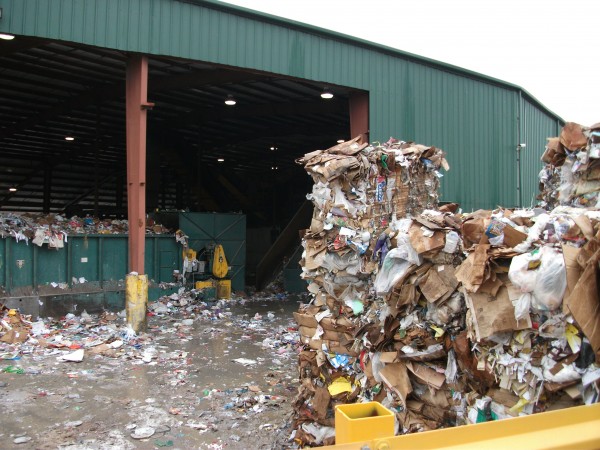Source of recycling funding at risk.
(Originally published December 12, 2012.)
At the beginning of this month, a MO Senate bill was pre-filed that would eliminate all solid waste management districts and reduce landfill tipping fees by the amount used for the districts’ overhead and administration — reducing the total amount allocated to support the increase of waste reduction, recycling, composting, and education. With grants from the St. Louis Jefferson Solid Waste Management District as a major source of funding for St. Louis Earth Day, and many other local environmental non-profits, the outcome of this Bill is of particular interest to the sustainable community in Missouri.
This bill will be reviewed in the 2013 Missouri Senate session which runs from January 9 to May 17. If passed without requiring a public vote, it will become effective in August 2013.
Below you will find information about:
- Senate Bill 13
- Compelling reasons to oppose SB-13.
- History of Solid Waste Management Districts (SWMD).
- Why SWMD funding is important.
- Background of landfill tipping fees.
- TAKE ACTION
About Senate Bill 13.
This act eliminates solid waste management districts and the Solid Waste Management Advisory Committee, significantly reduces the amount of money allocated for grants, and does not identify education as a potential area for receiving funding which was a focus of the St. Louis Jefferson Solid Waste Management District.
If passed, SB 13 will:
- Eliminate the Solid Waste Management Districts that currently distribute funding on a regional level and administer the grants.
- Decrease the amount of money collected from tipping fees at landfills for re-distribution as grants.
- The amount collected from tipping fees at solid waste sanitary landfills and transfer stations for grant re-distribution will decrease from $2.11 per ton accepted to $1.71 per ton.
- The amount collected from solid waste demolition landfills will decrease from $1.41 per ton accepted to $1.20 per ton.
- Increase the percentage of collected funds for use to cover administrative costs.
- Of the decreased amount of money collected from tipping fees, the allocation for administration will increase from 39% to 57%, while decreasing the percentage for actual grant funding from 61% to 43%.
- Decrease the overall amount of funding available for grants that support local efforts to reduce waste, increase recycling and composting, and related education.
- lower tipping fees + higher percentage of administration costs = less grant funding
Instead of utilizing the Solid Waste Management Districts to award funding to meet local needs with regional assets, the reduced amount of funding would be allocated to the Department of Natural Resources for distribution: “43% of the revenues, except any annual increases in the charge under section 260.330 during October 1, 2014, to October 1, 2017, which shall be used solely to fund the operating costs of the department, shall be allocated through grants, upon appropriation, to cities, counties, or to persons or entities providing solid waste management, waste reduction, recycling and related services” (lines 35 – 51).
Currently, a tipping fee is collected per ton accepted by landfills and transfer stations, with a small portion being deposited into the Solid Waste Management Fund. This act reduces the fee by the amount previously allocated for solid waste management districts’ overhead and administration costs. The fee for solid waste sanitary landfills and transfer stations is reduced from $2.11 per ton accepted to $1.71 per ton. The fee for solid waste demolition landfills is reduced from $1.41 per ton accepted to $1.20 per ton (SB-13).
Compelling reasons to oppose SB-13.
The Recycling Industry creates local jobs, conserves resources, saves energy and water, and expands landfills capacity. Only a small percentage of residential and commercial waste is currently recycled in Missouri, leaving many opportunities for improvement through education and increased access. Grant funding plays an important role in incentivizing and rewarding waste diversion from landfills.
- Tipping fees at Missouri landfills are already among the lowest in the country; why make it even more attractive to landfill waste instead of creating long-term strategies to reduce, reuse and recycle as much as possible?
- Higher tip fees incentivize reduction, reuse and recycling — lower tip fees make it cheaper to landfill waste without considering alternatives.
- Eliminating the solid waste districts does not eliminate administrative costs, it just shifts the responsibility to the MO Department of Natural Resources.
- The percentage allocated for administration INCREASES from 39% to 57%, while the percentage for actual grant funding decreases from 61% to 43%.
- In addition to an overall decrease in the amount of funds collected, the net result is significantly less money available to enable communities to establish and expand recycling initiatives.
- The percentage allocated for administration INCREASES from 39% to 57%, while the percentage for actual grant funding decreases from 61% to 43%.
- Funding allocations through the Solid Waste Management Districts means that funding is distributed and managed locally by people who understand the needs of each region. Without decentralized allocations, there are fewer checks and balances in place.
- This could put smaller businesses, governments, schools, municipalities, and non-profit organizations at a disadvantage when applying for and receiving funding.
History of Solid Waste Management Districts (SWMD).
Waste reduction and recycling gained prominence in Missouri when the Missouri Policy on Resource Recovery was announced in 1989. In order of highest priority, the elements of the integrated solid waste management hierarchy are: 1) reduce the amount of solid waste created; 2) reuse, recycle and compost; 3) recover and use energy from solid waste; and 4) incinerate or dispose in a sanitary landfill.
To help implement this policy, in 1990 the Missouri Solid Waste Management Act was amended by Senate Bill 530 (SB 530). The legislation set a goal of reducing the amount of solid waste generated statewide for disposal by 40 percent. To accomplish, SB 530 established a procedure allowing counties to form regional solid waste management districts to promote waste reduction and recycling (SWMD).
The 20 solid waste management districts were created by Senate Bill 530 passed in 1990. The districts are funded by a tipping fee currently set at $2.11 per ton of refuse brought to a landfill in Missouri, or to a transfer station in Missouri if the eventual destination is a landfill out of state. The fee at construction and demolition landfills is $1.41. The fee is distributed to districts using a formula that is based on a the tipping fee revenues and population for that district (Mid-Missouri Solid Waste Management District).
The St. Louis-Jefferson Solid Waste Management District (SWMD) is a regional agency created to assist the public, private, and not-for-profit sectors in establishing and expanding waste reduction and recycling. The District includes the City of St. Louis, St. Louis County, Jefferson County and St. Charles County. Areas within the district vary from highly urban to extremely rural, which require a wide variety of waste reduction and recycling programs to meet local needs (SWMD).

If SB 13 passes, there will be less funding to support local recycling programs and no indication to support education, also decreased incentive for large producers of waste to reduce and recycle.
Why SWMD funding is important.
A major tool in expanding waste reduction and recycling is the Waste Reduction and Recycling Grant Program. Since 1993, the SWMD has awarded more than 700 grants totaling over $30 million. The annual Grant Program provides valuable assistance to local governments, private businesses and not-for-profit organizations in the implementation and expansion of a wide variety of waste reduction and recycling projects. Funds may be used for a variety of costs associated with a project, from equipment to operating expenses.
The Grant Program provides an excellent opportunity to expand local recycling efforts throughout the region. Any municipality, county, public institution, not-for-profit organization, private business or individual currently operating in the City of St. Louis, St. Louis County, Jefferson County or St. Charles County, or who will be operating in these areas, is eligible to apply. The SWMD encourages the submission of cooperative projects or proposals which address regional or multi-jurisdictional waste reduction and recycling needs (SWMD).
“Recycling is one of the best environmental success stories of the late 20th century.” Recycling, which includes compost/organic waste, diverted 85 million tons of material away from disposal in 2010, up from 15 million tons in 1980. Recycling turns materials that would otherwise become waste into valuable resources. As a matter of fact, collecting recyclable materials is just the first step in a series of actions that generate a host of financial, environmental, and societal returns. There are several key benefits to recycling.
- Protects and expands U.S. manufacturing jobs and increases U.S. competitiveness in the global marketplace.
- Reduces the need for landfilling and incineration.
- Saves energy and prevents pollution caused by the extraction and processing of virgin materials and the manufacture of products using virgin materials.
- Decreases emissions of greenhouse gases that contribute to global climate change.
- Conserves natural resources such as timber, water, and minerals.
- Helps sustain the environment for future generations. (EPA)
Decreased landfill tipping fees reduces the incentive for large waste producers to reduce and recycle. It also sends a message that Missouri is not interested in conserving resources nor advancing sustainability efforts.
Background of landfill tipping fees.
Municipal solid waste landfills (‘landfills’) receive household waste, and can also receive non-hazardous sludge, industrial solid waste, and construction and demolition debris (EPA). The cost of waste disposal at a landfill or transfer station is referred to as the “tipping fee” (National Solid Wastes Management Association).
The gamut for disposal costs in the United States is wide and varied — ranging from an average of about $18 per ton of municipal solid waste to nearly $106 per ton of MSW. (‘Tipping fees vary across the U.S.’, Waste & Recycling News). In the St. Louis region, tipping fees usually fall within the $45 to $50 range, depending on the material.
Landfilling remains the most common way to dispose of municipal solid waste (MSW) in the United States. According to the U.S. Environmental Protection Agency (EPA), of the 243.0 million tons of MSW generated in 2009, 135.9 million tons (54.3%) were landfilled. Landfills received approximately the same amount of MSW since 1980 despite a steady decline in landfill numbers. In the 1970s, some 20,000 landfills existed and most were unlined “dumps.” Today, as a result of stringent federal and state regulations, there are slightly more than 1,900 MSW landfills (National Solid Wastes Management Association).
TAKE ACTION
We encourage you to review Senate Bill 13 yourself, and contact the bill’s sponsor, Senator Kurt Schaefer of District 15 to share your thoughts and concerns. Or get in touch with any members of the Senate’s Consumer Protection, Energy and the Environment Committee, including John T. Lamping and Timothy P. Green who represent parts of St. Louis County.
If you do contact your representative, or Senator Schaefer, be sure to mention that its important to support recycling, recycling education, and incentives to reduce the amount of landfill waste — as a vital key to ensuring the economic and environmental health and prosperity of our future generations.
Contact your senator: Legislator Lookup
Email template: Use this template to draft an email or use as a script when contacting Senator Schaefer and your representative.


